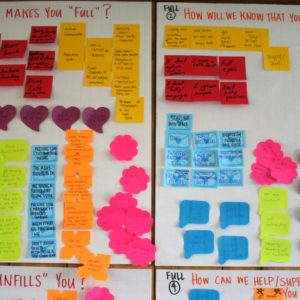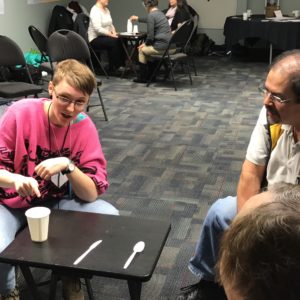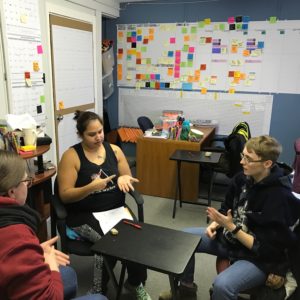
From Wikipedia: “The Conlang Flag is a symbol of conlanging created by subscribers to the CONLANG mailing list. It represents the Tower of Babel against a rising sun.”
WAYK has found play in some unusual corners of the linguistic internet. For a language game that was developed to maintain an unbroken lineage of conversational life, it’s especially odd that players would find it useful for languages that have never been spoken before. These languages are called “conlangs”, short for “constructed languages”. In this article I profile two such languages, “Lojban” and “Feayran”.
Loglan was an experimental language created in 1955, to “reflect the principles of logic”; Lojban, one of its children, was initially developed in 1987, as a more publicly accessible version. In wikipedia’s precise terms: “Lojban is a constructed, syntactically unambiguous human language based on predicate logic”. Alan Post, one of the early players and supporters of WAYK (you can see a WAYK workshop hosted by him in the Sunflower River Farm video), developed a WAYK approach for Lojban at his website that he calls “lo do ckiku ma zvati”, Lojban for (what else?) “where are your keys”.
“Having “Where are your Keys?” has given me something to focus on while I teach myself Lojban, ” says Alan. “It has provided the framework for understanding what my current fluency is, what I’m going to learn next, and how to teach other people the material I already understand.”
Another WAYK player, David Edwards, has actually been developing his own fantasy conlang called “Feayran”, and used WAYK to bring it to life.
“I’ve been working with WAYK since about March, and I’ve been really impressed by the system’s capabilities, particularly with people who claim to not be good at languages,” says David. “At a writers’ conference I attend every year in August, I got together with a bunch of friends and played several games–and they were an instant hit! We played Japanese, we played Mandarin, and then I even had some people (who knew that I conlang) ask to try a game in Feayran. Soooo much fun.”
Keep in mind that WAYK staff have never met, nor played with David. He learned WAYK purely from the online videos, podcasts, and articles. Back to David: “Friends have expressed interest before in learning my language, but nobody’s ever gotten past my second-or-so lesson. Not so with this game. Rather than being something to study or work at, it was suddenly this giant riddle that everyone was trying to figure out, and with no discussions of grammar or translation or anything like that, we were just playing, and doing our best to win! Already I have several friends who have worked out a lot of the language’s trickier concepts…and I’ve heard that they left the conference, went back home, and played Feayran with their own friends, when I was several states away! Awesome feeling. For real.”
For those interested in more, here’s the Feayran Universal Speed Curriculum.
These visionary players, though not working on endangered languages, continue to show us what is possible with the fluency game, in the spirit of pure play. The “Feayran” play style of turning a language into a giant riddle, for fun’s sake, is inspiring the rest of the WAYK community to develop even more techniques focused on making games as fun and adventurous as possible.
Remember, fun and adventure is instrumental in accelerating language acquisition – “play” is, after all, an accelerated learning state.





I used to be more into this stuff when I was younger. I spent much of my childhood coming up with my own codes, ciphers, alphabets, and languages (the appendixes to The Lord of the Rings were a huge inspiration to a kid already interested in both language and secrets). This is an interesting application of the WAYK process.
[…] WAYK has found play in some unusual corners of the linguistic internet. For a language game that was developed to maintain an unbroken lineage of conversational life, it's especially odd that players wou … Read More […]
.i gleki lonu do casnu la lojban .i la alyn cu mutce gunka lonume lu lo do ckiku ma zvati li’u .ije ri xamgu lo prenu poi selkei
I’m glad you mentioned lojban. Alan’s worked hard at lojbanizing the game and it’s been beneficial for those of us who’ve played.
I sincerely believe that minority languages need protection 🙂
Your readers may also be interested in the campaign to save endangered and dying languages by the World Esperanto Association. This association enjoys consultative relations with UNESCO.
The commitment to this aim was made, by the World Esperanto Association at the United Nations’ Geneva HQ in September.
http://uk.youtube.com/watch?v=eR7vD9kChBA&feature=related
If you have time please see http://uk.youtube.com/watch?v=_YHALnLV9XU Professor Piron was a translator with the United Nations in Geneva.
The argument for Esperanto can be seen at http://www.lernu.net